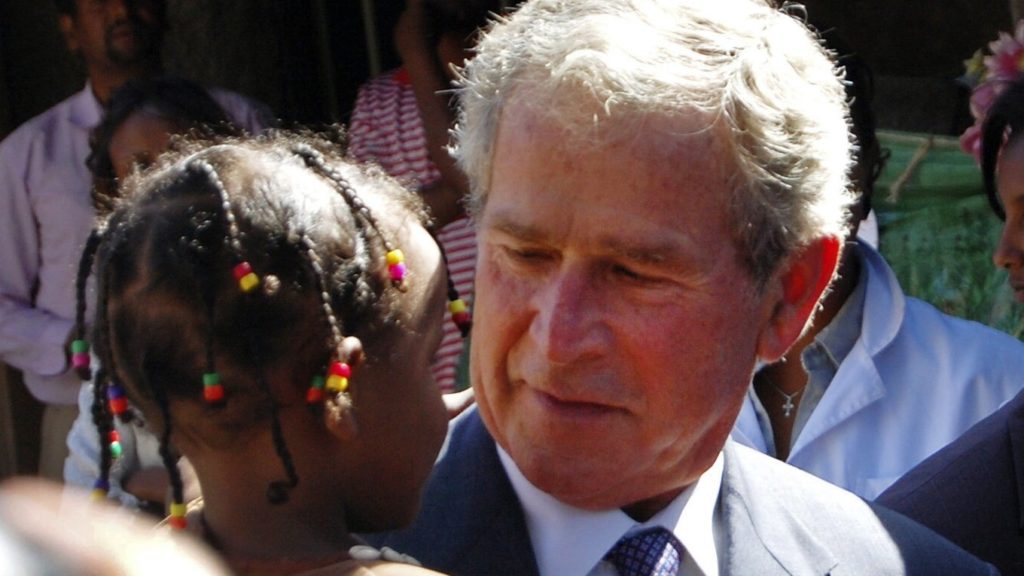Former President George W. Bush in an opinion piece for The Washington Post published Sept. 13 made his case for the reauthorization of PEPFAR, the U.S. President's Emergency Plan for AIDS Relief, calling that program pro-life — despite claims to the contrary from some pro-life advocates who have expressed concern some of the program's funds could be diverted to pay for abortions.
Bush, who infrequently comments on politics or current events in the years since he left office, wrote that his administration, "with huge bipartisan support," worked to implement the program "before an entire generation was lost."
"Members of Congress and American citizens from both parties should be proud," Bush wrote, adding that "instead of celebrating this success and extending these gains, some in Washington have called the future of this program — which accounts for less than one-tenth of 1 percent of our federal budget — into question."
PEPFAR was authorized by Congress and Bush in 2003, and is the U.S. government's global effort to combat HIV/AIDS. The program is the largest global health program devoted to a single disease.
PEPFAR is credited by some estimates with saving 25 million lives and scaling back the epidemic's spread, and is seen as an example of successful bipartisanship, continuing across each presidential administration since its passage. The program, in part, distributes antiretrovirals in countries where as many as one-third of adults have been impacted by HIV/AIDS. PEPFAR's funding has totaled more than $110 billion to date; Congress will weigh whether to reauthorize the program this year.
The program's reauthorization in Congress has stalled and will expire at the end of September without congressional action. President Joe Biden has stated he supports the program's reauthorization.
"We are on the verge of ending the HIV/AIDS epidemic. To abandon our commitment now would forfeit two decades of unimaginable progress and raise further questions about the worth of America’s word," Bush wrote.
Some pro-life groups have raised alarm about the program's reauthorization, arguing there is potential for PEPFAR funds to go to abortions overseas under the Biden administration. However, others have argued those claims are without merit, including the Biden administration, which denied it would use PEPFAR for such a purpose.
Some pro-life and conservative groups have announced plans to score against a vote in favor of PEPFAR's reauthorization in its current form on their congressional scorecards for lawmakers, including Susan B. Anthony Pro-Life America.
Bush noted the controversy in his piece, writing, "The reauthorization is stalled because of questions about whether PEPFAR’s implementation under the current administration is sufficiently pro-life."
"But there is no program more pro-life than one which has saved more than 25 million lives," Bush said. "I urge Congress to reauthorize PEPFAR for another five years without delay."
Asked for comment on PEPFAR and Bush's characterization of the program as pro-life, a spokesperson for the U.S. Conference of Catholic Bishops pointed to a July 14 letter to congressional lawmakers from Catholic Relief Services and the USCCB that argued in favor of PEPFAR's reauthorization while outlining important principles to guide Congress.
"We write to affirm PEPFAR's extraordinary life-saving work to date, and to express our strong, ongoing support for its goals and hope for its robust continuation," the letter said, adding that the "life-saving work of PEPFAR should never be entangled with the promotion of abortion, a grave evil and the opposite of life-saving care."
At a February event in Washington marking the program's 20th anniversary, Bush made the case for its reauthorization, arguing the U.S. is a prosperous nation "to whom much has been given, much is expected" -- a reference to Jesus Christ's words in Luke 12:48.
Bush argued PEPFAR is both in the moral and national security interests of the U.S., as it saves lives and strengthens diplomatic ties with recipient nations. He said a large-scale loss of life from the AIDS epidemic would have destabilized the African continent, leaving it vulnerable to bad actors, such as al-Qaida.

